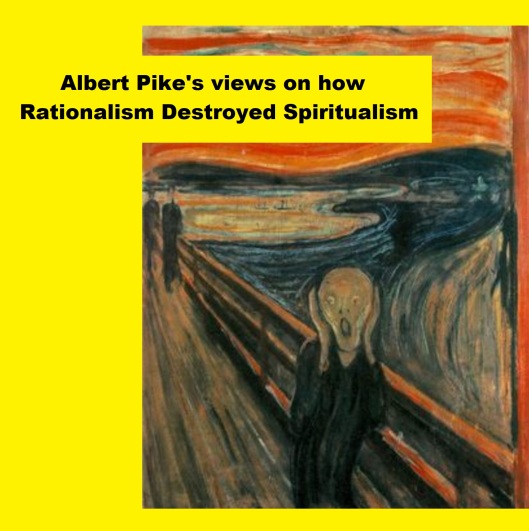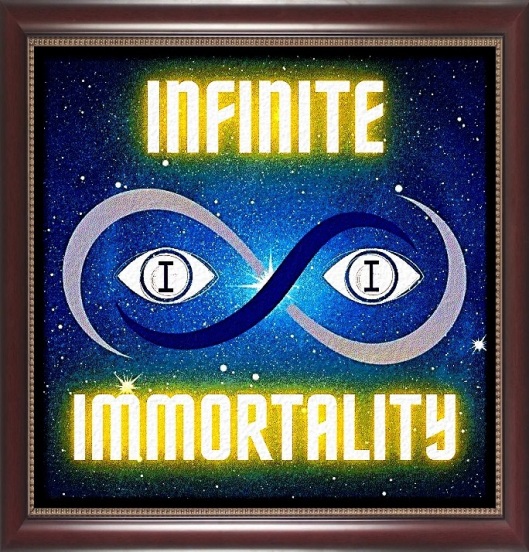
Although short, this writing is of particular importance. You see, contemporary culture has replaced the ideals of spiritualism with rational thought. However, at least according to Albert Pike, rational thought should be based on divinely inspired thinking, certainly not man’s justifications for whatever he can assert. There is little doubt that our culture is continually and constantly changing; but the further we distance ourselves from God, it becomes evident that we have lost our way.
Pike firmly believed that God gave man his intelligence, or soul; which is something that existed well before being placed into a human body. As such, his reasoning, like his irrational principle also comes from God. Therefore, within man exist “inclinations and passions” that produces order and disorder; something that emanates from spirits. As a result, within the earthly body runs both the “irrational Principle” and the “rational Principle,” which operate concurrently, and “are hated by God.” Moreover, the “rational soul” is held captive in a prison, much like that of a coffin (Albert Pike, Morals and Dogma, 1872, p. 251).
Learn more about the mysteries by visiting Infinite Immortality YouTube Channel.
Click on the picture below. Thank you for visiting!
Therefore, the present state of man is not his “primitive condition,” like that of the Logos, or his “first estate.” No, he must “raise himself again” through ancient wisdom, and the use of “Angels, which God has commissioned to aid” man to free himself from the human body’s bond on reality. Likewise, an evil existence is permitted by God, because he wants man to exercise this liberty over himself. As such, the purification of the soul is conducted, not by any law, but by the light from the heavenly realms above. Yet, there are those who will “persevere in evil,” who go from “body to body,” sitting firmly in the seats of passion and the devil’s desire (p. 251).
So what can an animal tell us about instinctiveness? There is of course a difference between the common animal and man, or them and us. An animal thinks, dreams, remembers, plans, devises, loves, and even communicates its thoughts with other animals; just like that of man. Therefore, the animal is rational, like that of man. In fact, it is this similarity that has caused many to believe that the common animal has a soul. It is this “insoluble mystery” that has puzzled man since the beginning of time itself. Therefore, as some have speculated “‘instinct’ is but a word without meaning.” Pike further explained that perhaps God was in the animal, making it “the greatest and most wonderful of mysteries.” Consequently, like man, an animal is not a machine (p. 303).
Among the Platonists was the belief that matter was inert; that it had a “lawless motive power” with “an ungodlike soul.” Although controlled by God, it was a “plastic power of the Deity;’ although turbulent, it was still “irrational.” By extrapolation, it can be seen that out of chaos was transformed an “organized world” or a “blind soul into a rational principle.” Therefore, the irrational eventually becomes rational; that a “spiritual life” is possible for humanity. Yet, this progress is all too often dependent on the “blind sway of passion and appetite”, and “malignant spirits” and their offspring (p. 556).
Amongst Alexandrian Gnosticism existed the concept that perfection was “ever evolving itself into the less perfect.” In short, in opposition to this “fullness” is the possibility of a “divine life.” Like the belief that a “shadow accompanies the light.” Furthermore, matter, like stagnant water, contains a dead life, and has an “inherent tendency” toward that of evil. It has even been speculated that life is foreign to itself, because it “makes no encroachment on the Divine.” Sadly, the concept of a Divine Life has become a feeble notion, only because we have removed ourselves from the concept of perfection; that such a notion is not possible. We now accept the idea that man is “imperfect” and a “defective product;” instead of seeking “its connection with the chain of Divine Life.” Our society seeks and kneels at the altar of “material chaos” instead. However, what if man could sample just a “drop from the fullness of the Divine life” that “bubbles over into the bordering void” he now dismisses. By this “comixture with the living principle” man could receive the well being he has hidden within himself, but instead, he is “corrupted by mingling with the chaotic mass.” The “new world,” once taught by the ancients, has resulted in a defective life of “ungodly nature-power, which obstinately resists all influence of the Divine.” The world now allows “wicked men and malignant spirits” to rule with a “rational will,” rather than a spiritual one. “Blind passions” have ascended to rule man’s logic and emotions. Whereas, a “soul under divine reason” resists such desires (p. 555).
Aristotle deducted that God was personal; that he was living and loving, unlike the Hebrew God, who was based on intelligence; a common idea from the time period. Nevertheless, in time “moral action and objective thought” were dismissed for the “veil of impenetrable mystery.” This contradiction can be resolved by an understanding of ideas that move (spiritualism) and don’t move (rationalism). As such, God (spiritualism) is the “final cause,” or the “one form;” the “one good, including all good, the goal of the longing of the universe, moving the world as an object of love,” like “rational desire moves the individual.” Indeed, God is the internal or self realized final cause, having no end beyond himself, “but he is no moral agent.” There is a “divine quality of active and yet tranquil self contemplation” that “characterizes intelligence,” which has a divine mind. His thoughts, unlike ours, are unconditional. Unlike God, “man’s good is beyond himself.” Yet God is energy and purity, whereas man can only make a modest effort towards such a lofty aim (p. 679).
The first cause is said to have moved all; or the act was first, followed by the creation of an everlasting universe. Therefore, all movement is caused by God, and out of this movement is the “impenetrable mystery.” Likewise, “God is thus formal, efficient and the final cause.” Likewise, there is a divine active substance for intelligence, which is guided by an intellectual force; “absolute thought is the absolute good,” and “divine thought is the thinking of thought.” And this idea is further supported by Plato, who believed that “the divine principle of good become realized in nature.” In short, if a person is spiritual, he is expressing a love for the “rational desire,” which is all to often forgotten in man’s self centered actions (p. 679-681).
In conclusion, if God is considered rational, are human’s reasonable, no, certainly not; for you see, “to personify the absolute reason, is to determine the Divine Ideal.” This, perhaps more than anything else, is why man falls short of divine reasoning (p. 738). And with regard to the idea that rationalism destroys spiritualism, we see that Pike was right on topic. The further and further we distance ourselves from spiritualism, through the use of rational thought, the less spiritual we have become. Think about that the next time you try to justify your behavior, action, or even a goal, rationally. The following question must always be asked of oneself – are my rational actions in line spiritually?
So Mote It Be!
Hank Kraychir
Blue Lodge Master Mason – Scottish Rite Mason – York Rite Mason – Knight Mason – Allied Mason – York Rite College – Holy Royal Arch Knight Templar Priest – Red Cross of Constantine – Societas Rosicruciana in Civitatibus Foederatis


You must be logged in to post a comment.